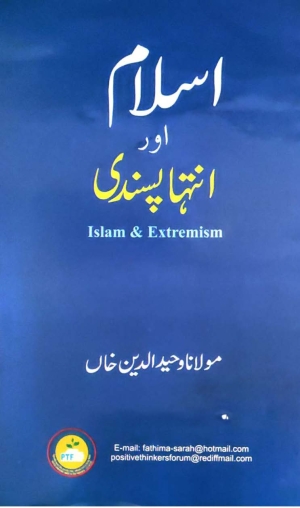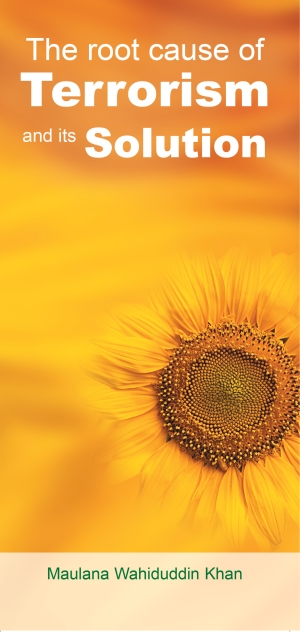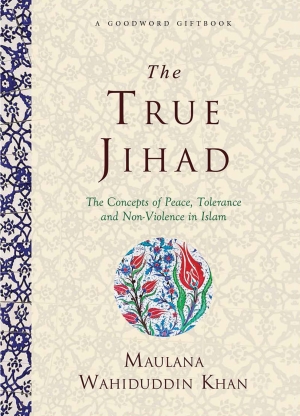The Quran is very clear in its views on extremism: “Do not go to excess in your religion.” (4:171) The same point has been made in a hadith. The Prophet of Islam said, “You should restrain yourselves from committing excesses (ghulu) in religion, for it was due to their having gone to extremes in religion that previous communities were destroyed.” (Musnad Ahmad, Hadith No. 1851)
Ghulu means extremism. The way of extremism is wrong, whatever the circumstances because it goes against the spirit of religion. Extremism usually engenders attitudes that call for war and violence. Those who have extremist tendencies remain dissatisfied with the path of moderation since it strikes them as being far from effective. That is why they easily incline toward violence to achieve their objectives. Moderation, which is the opposite of extremism, is closely interlinked with peace. When people possess the virtue of moderation, they necessarily think in terms of peace and engage in their efforts in a peaceful manner.
Featured Articles
Featured Videos
FAQs
Contrary to common belief, Islam does not teach extremism. It actually teaches its adherents to follow the moderate or balanced path. In the fourth chapter of the Quran the following injunction has been given: “Do not go to excess in your religion.” (4:171)
The same point has been made in a hadith. The Prophet of Islam observed: “You should restrain yourselves from committing excesses (ghulu) in religion. For it was due to their having gone to extremes in religion that the previous communities were destroyed.” (Al-Nasai, Ibn Majah, Musnad Ahmad, 1/215, 347)
Ghulu means extremism. The way of extremism is wrong, whatever the circumstances, for it goes against the spirit of religion. Indeed, it is proneness to extremism, which at times culminates in war and violence. Those who suffer from extremist tendencies remain dissatisfied with the path of moderation since this strikes them as being far from the ideal. That is why they so easily incline towards violence and are ever ready to open hostilities in the name of achieving their objectives.
Moderation, which is the opposite of extremism, is closely interlinked with peace. When people possess the virtue of moderation, they necessarily think in terms of peace and will engage in their struggle in a peaceful manner. Where there is moderation there is peace, and vice versa.
According to a Hadith, the Prophet Muhammad observed: That moderate action is the best of all actions. Hazrat Ali advised the people: ‘Adopt the middle path.’ (Tafsir Qurtubi, 154/2)
The middle path means the path of moderation. One instance of it can be seen in the following verse of the Quran: ‘Be neither miserly nor prodigal, for then you should either be reproached or be reduced to penury.’ (17:29)
The same point, worded differently, has been made in another verse which characterizes “the true servants of the Merciful” as “those who, when they spend, are not extravagant and not niggardly, but maintain a just balance between those extremes.” (The Quran, 25:67)
According to this verse, moderate spending means neither lavishness nor miserliness but rather a balanced expenditure, which will make life much easier to lead. In the same way, as regards optional fasts, prayers, etc., a middle path is desirable for man, as this enables him to maintain such a pattern of behaviour over a long period of time.
The middle path, to put it differently, is the non-emotional way. If a man loses his mental balance when confronted with any difficult situation in life, he goes to one extreme or the other. But if he keeps his feelings under control, he will be able to determine the proper course of action by giving it ample thought. A well-considered deed is always a moderate one. One who does not follow a moderate path will exceed all bounds both in friendship and in enmity. He will also be given to undue optimism and pessimism in respectively positive and negative situations, and will unnecessarily regard some individuals as too bad and others as too good. However, it is the verdict of nature that in this world a moderate approach in life always succeeds, while taking the path of extremes inevitably leads to failure.
Source: The True Face of Islam
The Quran teaches us not to be extremist in our religion. Its exact words are: ‘People of the Book! Do not go to extremes in your religion.’ (4: 171)
We also learn from a saying of Prophet Muhammad that extremist tendencies have always been the chief reason for religious groups going astray. That is why the Prophet once observed:
‘’Sedulously refrain from extremism, for previous communities were destroyed only because of their extremist tendencies in religious matters.”
Although there are many actions which in form appear to be morally acceptable, it is to the spirit of these acts rather than their external form that Islam attaches real importance.
Ghulu, meaning extremism, is engendered in a religious community when it goes into a state of decline, and this, in fact, is a sign of its degeneration. There is a tradition of Prophet Muhammad that forewarns his followers of the rot that has set in. He said that all those evils which had arisen in previous communities would also arise in his own community on a greater scale. To make his meaning clear, he said:
“Where previous communities were divided into 72 sects Muslims will be divided into 73 sects.” (Abu Dawud, Hadith No. 4597)
There are innumerable cases of ideological extremism in Islamic history. But we also find among Muslims another kind of extremism that probably never existed in previous communities. When the Prophet said that while the previous communities were divided into seventy-two sects and the Muslims would be divided into seventy-three sects, he was giving an example of this other kind of ghulu (extremism) which can be described as political extremism. No previous community had ever been crowned by such political glory as was enjoyed by the Muslims for almost a thousand years after the emergence of Islam. Political glory was not, however, a part of the Islamic creed, but a part of history. But Muslims stressed this fact of political glory to such an extent that, for all intents and purposes, it became incorporated into their religious creed. The result of this political extremism is the violent jihad we experience in the Muslim world of today.
Source: Spirit of Islam April 2016









